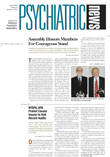With regard to the October 3 letter on teaching psychotherapy to residents, I would like to share some experiences on developing the psychiatry clerkships for Ohio’s “experimental” medical school, Northeastern Ohio Universities College of Medicine, from 1975 to 1983.
First, our “issues and purposes” group identified our basic assumptions about the nature of our students and educational mission. Our students were supposed to be Ohio’s “best and brightest.” This meant we should educate them to be leaders in their communities as well as solid and energetic clinicians in six primary care areas (yes, psychiatry was one of the six!). Further, we were cognizant of Robert Louis Stevenson’s remark, “The physician should be the flower of civilization—such as it is. . . .”
From here it was a simple step to acknowledge the need for students to be introduced to the concept of “the interior life.” Our hope was to encourage habits of reflection and greater self-knowledge (“the examined life”). A crucial corollary was the relationship of motives, feelings, and conflicts—the stuff of the interior life of the mind—to health and illness. But then what? And how to do it in eight to 12 weeks?
Luckily, in the Kent State track of the six-year program we were able to teach some philosophy in a pilot medical ethics seminar, then required in the second-year clerkship. We used interesting philosophy texts such as William Barrett’s Irrational Man and Veatch’s Rational Man.
Then in the weekly seminars during the fifth-year clerkship, the students read Freud’s “Clark Lectures,” “Mourning and Melancholia,” and “The Problem of Anxiety,” as well as Ian Gregory’s wonderful text written specifically for medical students, Psychiatry–Essentials of Clinical Practice. This led to stimulating discussions of psychosomatics.
Meanwhile on the various hospital wards, we had the students shadow selected attendings, who also met with them individually to provide support. We were helped in this by the advice of our brilliant first dean and provost, Robert Liebelt, M.D., Ph.D. When we asked him, “What should we teach,” he responded, “Why, just duplicate yourselves.”
Since most patients were hospitalized 30 to 60 days then, the students were expected to get to know and work up one patient in detail and write up the case. We also had several sites with one-way mirrors or closed-circuit TV where students could observe psychotherapy done by selected faculty. There was no attempt to “teach psychotherapy” per se.
As I get older under the tyranny of time, I feel the need to convey to younger colleagues quickly “how we did things” before I shuffle off to Buffalo.
